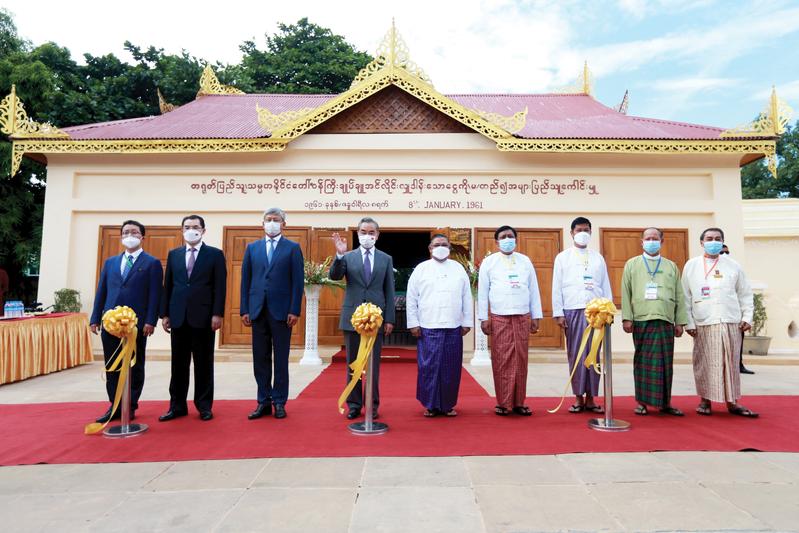 State Councilor and Foreign Minister Wang Yi (fourth from left) and Myanmar’s Foreign Minister U Wunna Maung Lwin (center) join in the reopening ceremony of the refurbished Zhou Enlai Pavilion in Bagan, Myanmar, on July 3. (ZHANG DONGQIANG / XINHUA)
State Councilor and Foreign Minister Wang Yi (fourth from left) and Myanmar’s Foreign Minister U Wunna Maung Lwin (center) join in the reopening ceremony of the refurbished Zhou Enlai Pavilion in Bagan, Myanmar, on July 3. (ZHANG DONGQIANG / XINHUA)
China expects joint efforts with the Association of Southeast Asian Nations to encourage Myanmar to pursue political reconciliation and restart the democratic transition process, State Councilor and Foreign Minister Wang Yi said.
Wang made the remark on July 3 in a meeting with Cambodian Deputy Prime Minister and Foreign Minister Prak Sokhonn, the ASEAN special envoy for Myanmar. The talks were held in Bagan, a city in central Myanmar, on the sidelines of the seventh Lancang-Mekong Cooperation Foreign Ministers’ Meeting.
Wang said China encourages all political parties in Myanmar to prioritize the overall situation and the interests of its people, take rational and practical efforts to restore stability, and achieve peace at an early date.
He also voiced the hope of working together with ASEAN to encourage Myanmar to explore a path of political development that suits its national conditions.
China expects the regional group to adhere to “the ASEAN way” and uphold the basic principles and traditions of noninterference in internal affairs, and a consensus-based approach, Wang said.
ASEAN should stay focused, remove distractions, coordinate in a patient way, and constructively implement its five-point consensus to safeguard the overall unity and leading role of the group, Wang added.
Sokhonn briefed Wang about his second visit to Myanmar as ASEAN’s special envoy, which took place last week. Cambodia is the rotating chair of the regional group this year.
During his visit, Sokhonn paid a courtesy call to Myanmar State Administration Council Chairman Senior General Min Aung Hlaing.
The two sides exchanged views on the implementation of the five-point consensus, a program agreed by ASEAN members in April 2021 to resolve the Myanmar crisis, and the current political and humanitarian situation in Myanmar, said Cambodia’s Foreign Ministry.
Min Aung Hlaing expressed his full support for the fulfilling of the special envoy’s mandate, while Prak Sokhonn urged the Myanmar State Administration Council to explore ways to work with the United Nations Secretary-General’s Special Envoy Noeleen Heyzer, the ministry said in a statement on July 4.
With so little space for dialogue, it was important to keep the lines of communication open, said Joel Ng, deputy head of the Centre for Multilateralism Studies of the S. Rajaratnam School of International Studies at Singapore’s Nanyang Technological University.
From this perspective, Prak Sokhonn’s Myanmar trip did make some achievement, Ng said, including delivering messages on the need for dialogue with the opposition. He said ASEAN needs a clear outline of the standard of progress made toward the five-point consensus.
The international community must insist on using agencies such as the United Nations for the distribution of humanitarian aid, to avoid politicization or any appearance of partiality, Ng told China Daily.
China’s bilateral engagement with Myanmar on the sidelines of the Lancang-Mekong Cooperation Foreign Ministers’ Meeting was “positive”, he said.
James Gomez, regional director at the Bangkok-based research institute Asia Centre, said he does not expect more substantial achievement by the current ASEAN special envoy, since Cambodia’s term as ASEAN chair will end in November.
“At this moment, there is no significant progress,” Gomez told China Daily.
Wang also met on July 3 with Myanmar’s Foreign Minister U Wunna Maung Lwin and said Beijing cherishes China-Myanmar friendship featuring mutual respect and equal treatment.
Du Lan, deputy director of the Department for Asia-Pacific Studies, noted that China, as Myanmar’s largest neighboring country, expects the neighbor to achieve political and social stability, national development and revitalization, which is of vital importance for China’s interests in the country.
Since Myanmar’s cabinet reshuffle in February last year, Wang has met his Myanmar counterpart twice in China, and Sun Guoxiang, China’s special envoy for Asian affairs, has visited Myanmar twice.
Myanmar is co-chair of the Lancang-Mekong Cooperation mechanism this year, and the country is where the mechanism was first initiated. Du observed that Myanmar would like to take the Lancang-Mekong Cooperation Foreign Ministers’ Meeting as an opportunity to show its positive attitude to the outside world and boost internal economic recovery.
“China can also take this occasion to push Myanmar’s peace negotiations and offer the country assistance to promote cooperation under the Lancang-Mekong Cooperation mechanism,” Du added.
China has been the biggest provider of anti-epidemic assistance to Myanmar, having offered 51 million vaccine doses to the nation so far and also helping it with filling and packaging COVID-19 vaccines locally.


